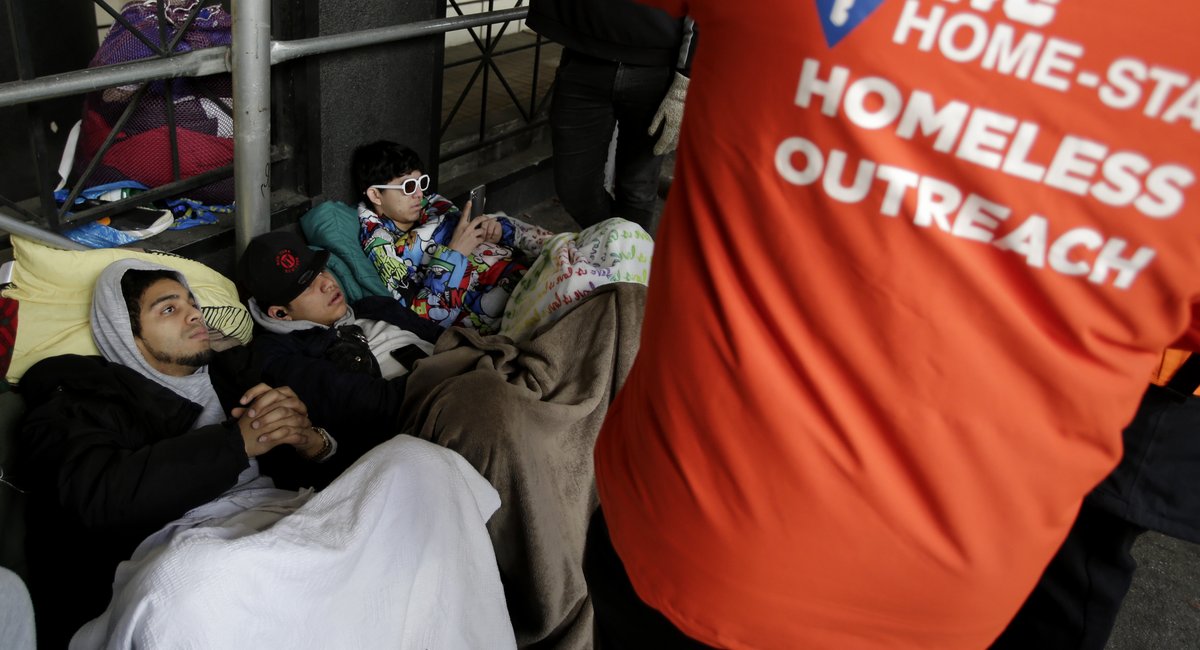The sheet of paper slipped under Carlos’ door on Wednesday night came as a shock.
“WARNING — FOR FAMILIES WITH CHILDREN,” it said in Spanish, below the letterhead for the city Department of Homeless Services.
After living at a hotel shelter on the Upper West Side for eight months, the Venezuelan asylum seeker and his 6-year-old daughter may soon be required to leave in as few as 60 days, he learned. Carlos asked Gothamist not to share his last name for fear it would affect his immigration case.
The warning was for a new, sweeping expansion of Mayor Eric Adams’ administration’s cost-cutting policy of limiting shelter stays for migrants, set to be rolled out over the next several months. Until now, nearly half of the migrants living city shelters — specifically, 30,000-some parents and children living in shelters run by the local Department of Homeless Services — have been spared the city’s eviction policy.
Now, because of a change in state policy, they could be evicted as early as October.
Any family without other accommodations will be allowed to reapply for another shelter space, city officials said. The new rules were first reported by the local news outlet THE CITY.
The expanded eviction policy is the Adams administration’s latest effort to tighten shelter rules for migrants, in a move to nudge them to leave city shelters, and to curtail the estimated extra $4 billion to $9 billion for their care over the next two years. In recent months, more adult migrants — including some who have been ejected from shelters due to the stay limits — have been sleeping in tents and on park benches across the city, including on Randall’s Island and in a Clinton Hill playground.
Carlos, 27, said the dread set in right away. His daughter had just settled into her school and made a few friends. He hadn’t yet received a work permit, and has only worked occasional shifts at a car wash. Without a steady income, he wondered where he and his daughter could go and whether it would mean his daughter changing schools early in the school year.
“It’s a government order. We have to follow it,” Carlos said. “But we don’t have anywhere else to stay.”
Immigrant and homeless advocates warn that the new rules could lead to more migrant children shuffling between schools, missing class and living on the streets. Some critics claim the new policy has further entrenched an unfair system, in which longtime New Yorkers are allowed to remain in shelter indefinitely, while new migrants can be evicted.
City Council Speaker Adrienne Adams and other elected officials have called for an end to the shelter evictions, in one of the many disputes between the Council and the Adams administration. A Council bill that would ban the shelter stay limits is pending.
Carlos’ warning letter, and three others reviewed by Gothamist, made no mention of the possibility to reapply for shelter. Some migrants staying at DHS shelters said they hadn’t yet received any warning of the coming changes and were instead turning to Whatsapp groups for migrant parents, where participants shared fears and — in some cases, inaccurate — rumors about the new rules.
“Not sustainable” migrant shelter population
Adams defended the tightened restrictions in a Tuesday press conference, pointing to other cities’ use of shelter limits for migrants, financial concerns and “traumatizing” conditions in emergency shelters.
“It’s not financially sustainable,” Adams said. “And it’s just not the right thing to do to human beings.”
For the last several months, New York City’s migrant shelter census has hovered around 65,000. That’s despite a steep decline in the number of new migrants arriving and seeking shelter in the city and stricter shelter limits for single adults.
Warning letters provided to migrant families in DHS shelters earlier this week said the 60-day eviction notices “will be given out on a rolling basis beginning later this summer.” Officials aim to initially apply the policy to households who have been in their care for the longest time, according to DHS spokesperson Neha Sharma.
Families also receive “intensive case management” to help them apply for asylum, work permits and other social services, city officials have said. However, a May audit by Comptroller Brad Lander’s office found a dearth of those promised services.
Deputy Mayor Anne Williams-Isom has said in recent months that the status quo is “not sustainable” and that the city must “continue to be innovative in order to move people out of shelter.” She and Adams have repeatedly said the state and federal government have provided insufficient financial aid to the city to care for the migrants.
Exceptions to the rule
There’s a notable exception to the newly expanded shelter restrictions — that is, for the small but growing number of migrant families receiving public assistance.
Anthony Farmer, a spokesperson for the state Office of Temporary and Disability Assistance, said in a statement that the agency recently authorized the city to issue 60-day eviction notices to migrant families not receiving public assistance. Neither he nor city officials provided any data on how many families the exception would apply to.
Pregnant mothers and parents with newborns can also receive temporary reprieves to the city’s now sweeping migrant-shelter eviction policy. Migrants with disabilities may also be approved for exceptions on a case-by-case basis.
